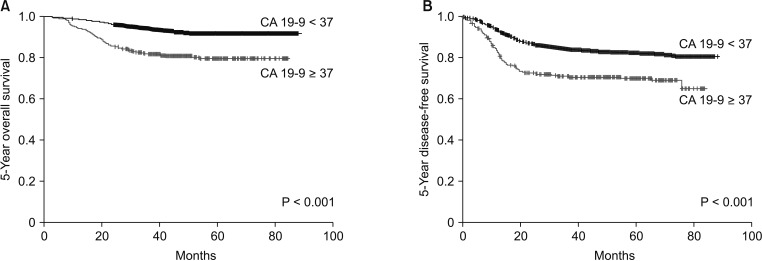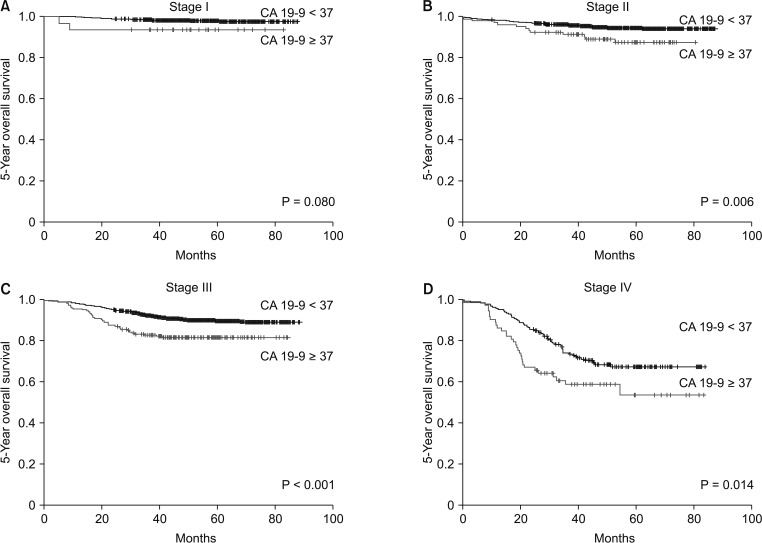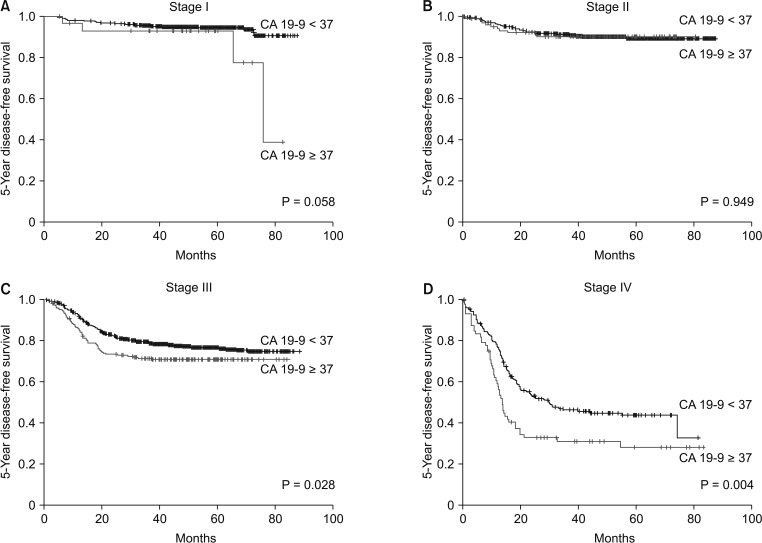Ann Surg Treat Res.
2019 Mar;96(3):107-115. 10.4174/astr.2019.96.3.107.
High preoperative serum CA 19-9 levels can predict poor oncologic outcomes in colorectal cancer patients on propensity score analysis
- Affiliations
-
- 1Department of Surgery, Samsung Medical Center, Sungkyunkwan University School of Medicine, Seoul, Korea. hckimcrc@gmail.com
- 2Department of Surgery, Kangbuk Samsung Hospital, Sungkyunkwan University School of Medicine, Seoul, Korea.
- KMID: 2438686
- DOI: http://doi.org/10.4174/astr.2019.96.3.107
Abstract
- PURPOSE
The purpose of this study is to evaluate the prognostic value of preoperative serum CA 19-9 levels in colorectal cancer patients.
METHODS
Between 2008 and 2011, 4,794 consecutive patients who underwent curative resection for colorectal cancer were analyzed. These patients were classified into 2 groups according to preoperative CA 19-9 (high CA 19-9: ≥37 ng/mL, n = 440; normal CA 19-9: <37 ng/mL, n = 4,354). We used 1:20 propensity score matching to adjust for potential baseline confounders between groups.
RESULTS
After matching, 424 patients (10.5%) among 4,021 patients with colorectal cancer showed a high pre-CA 19-9 level (≥37 ng/mL). There were no significant differences between these 2 groups in age, sex, preoperative CEA level, or T, N, and M stage after matching. Of the 424 patients with high pre-CA 19-9, 141 (33.3%) exhibited cancer recurrence more frequently than patients with normal preoperative CA 19-9 (18.5%). Patients with an elevated preoperative CA 19-9 level showed significantly poorer survival than those with normal levels. The 5-year overall survival rate was 79.7% in the high preoperative CA 19-9 group and 91.9% in the normal preoperative CA 19-9 group (P < 0.001). The 5-year disease-free survival rate was 70.2% in the high preoperative CA 19-9 group and 82.7% in the normal preoperative CA 19-9 group (P < 0.001).
CONCLUSION
Patients with an elevated preoperative CA 19-9 level in colorectal cancer have a significantly poorer prognosis than those with normal levels of CA 19-9. We therefore suggest preoperative CA 19-9 level can be used as an additional prognostic indicator of poor outcomes in colorectal cancer.
Keyword
MeSH Terms
Figure
Reference
-
1. Locker GY, Hamilton S, Harris J, Jessup JM, Kemeny N, Macdonald JS, et al. ASCO 2006 update of recommendations for the use of tumor markers in gastrointestinal cancer. J Clin Oncol. 2006; 24:5313–5327. PMID: 17060676.
Article2. Koprowski H, Steplewski Z, Mitchell K, Herlyn M, Herlyn D, Fuhrer P. Colorectal carcinoma antigens detected by hybridoma antibodies. Somatic Cell Genet. 1979; 5:957–971. PMID: 94699.
Article3. Zheng CX, Zhan WH, Zhao JZ, Zheng D, Wang DP, He YL, et al. The prognostic value of preoperative serum levels of CEA, CA 19-9 and CA72-4 in patients with colorectal cancer. World J Gastroenterol. 2001; 7:431–434. PMID: 11819806.4. Thomas WM, Robertson JF, Price MR, Hardcastle JD. Failure of CA 19-9 to detect asymptomatic colorectal carcinoma. Br J Cancer. 1991; 63:975–976. PMID: 2069854.5. Nakagoe T, Sawai T, Tsuji T, Jibiki MA, Nanashima A, Yamaguchi H, et al. Preoperative serum level of CA 19-9 predicts recurrence after curative surgery in node-negative colorectal cancer patients. Hepatogastroenterology. 2003; 50:696–699. PMID: 12828063.6. Zhang LN, OuYang PY, Xiao WW, Yu X, You KY, Zeng ZF, et al. Elevated CA 19-9 as the most significant prognostic factor in locally advanced rectal cancer following neoadjuvant chemoradiotherapy. Medicine (Baltimore). 2015; 94:e1793. PMID: 26559251.7. Kouri M, Pyrhonen S, Kuusela P. Elevated CA 19-9 as the most significant prognostic factor in advanced colorectal carcinoma. J Surg Oncol. 1992; 49:78–85. PMID: 1738240.8. Chen CC, Yang SH, Lin JK, Lin TC, Chen WS, Jiang JK, et al. Is it reasonable to add preoperative serum level of CEA and CA 19-9 to staging for colorectal cancer? J Surg Res. 2005; 124:169–174. PMID: 15820244.9. Takakura Y, Ikeda S, Imaoka Y, Urushihara T, Itamoto T. An elevated preoperative serum carbohydrate antigen 19-9 level is a significant predictor for peritoneal dissemination and poor survival in colorectal cancer. Colorectal Dis. 2015; 17:417–425. PMID: 25512077.
Article10. Barillari P, Bolognese A, Chirletti P, Cardi M, Sammartino P, Stipa V. Role of CEA, TPA, and Ca 19-9 in the early detection of localized and diffuse recurrent rectal cancer. Dis Colon Rectum. 1992; 35:471–476. PMID: 1568399.
Article11. Ueda T, Shimada E, Urakawa T. The clinicopathologic features of serum CA 19-9-positive colorectal cancers. Surg Today. 1994; 24:518–525. PMID: 7919734.
Article12. Yu H, Son GM, Joh YG. The clinical significance of preoperative serum levels of carbohydrate antigen 19-9 in colorectal cancer. J Korean Surg Soc. 2013; 84:231–237. PMID: 23577318.
Article13. Huh JW, Lee WY, Park YA, Cho YB, Yun SH, Kim HC, et al. Prognostic factors associated with primary cancer in curatively resected stage IV colorectal cancer. J Cancer Res Clin Oncol. 2014; 140:435–441. PMID: 24414039.
Article14. Park IJ, Choi GS, Lim KH, Kang BM, Jun SH. Serum carcinoembryonic antigen monitoring after curative resection for colorectal cancer: clinical significance of the preoperative level. Ann Surg Oncol. 2009; 16:3087–3093. PMID: 19629600.
Article15. Nakayama T, Watanabe M, Teramoto T, Kitajima M. CA 19-9 as a predictor of recurrence in patients with colorectal cancer. J Surg Oncol. 1997; 66:238–243. PMID: 9425326.16. Lin PC, Lin JK, Lin CC, Wang HS, Yang SH, Jiang JK, et al. Carbohydrate antigen 19-9 is a valuable prognostic factor in colorectal cancer patients with normal levels of carcinoembryonic antigen and may help predict lung metastasis. Int J Colorectal Dis. 2012; 27:1333–1338. PMID: 22426691.
Article17. Reiter W, Stieber P, Reuter C, Nagel D, Lau-Werner U, Lamerz R. Multivariate analysis of the prognostic value of CEA and CA 19-9 serum levels in colorectal cancer. Anticancer Res. 2000; 20(6D):5195–5198. PMID: 11326694.18. Yakabe T, Nakafusa Y, Sumi K, Miyoshi A, Kitajima Y, Sato S, et al. Clinical significance of CEA and CA 19-9 in postoperative follow-up of colorectal cancer. Ann Surg Oncol. 2010; 17:2349–2356. PMID: 20217258.19. Morita S, Nomura T, Fukushima Y, Morimoto T, Hiraoka N, Shibata N. Does serum CA 19-9 play a practical role in the management of patients with colorectal cancer? Dis Colon Rectum. 2004; 47:227–232. PMID: 15043294.20. Schott A, Vogel I, Krueger U, Kalthoff H, Schreiber HW, Schmiegel W, et al. Isolated tumor cells are frequently detectable in the peritoneal cavity of gastric and colorectal cancer patients and serve as a new prognostic marker. Ann Surg. 1998; 227:372–379. PMID: 9527060.
Article21. Yang SH, Lin JK, Lai CR, Chen CC, Li AF, Liang WY, et al. Risk factors for peritoneal dissemination of colorectal cancer. J Surg Oncol. 2004; 87:167–173. PMID: 15334631.
Article22. Kerscher AG, Chua TC, Gasser M, Maeder U, Kunzmann V, Isbert C, et al. Impact of peritoneal carcinomatosis in the disease history of colorectal cancer management: a longitudinal experience of 2406 patients over two decades. Br J Cancer. 2013; 108:1432–1439. PMID: 23511564.
Article23. Shimono R, Mori M, Akazawa K, Adachi Y, Sgimachi K. Immunohistochemical expression of carbohydrate antigen 19-9 in colorectal carcinoma. Am J Gastroenterol. 1994; 89:101–105. PMID: 8273774.
- Full Text Links
- Actions
-
Cited
- CITED
-
- Close
- Share
- Similar articles
-
- The clinical significance of preoperative serum levels of carbohydrate antigen 19-9 in colorectal cancer
- Preoperative Carbohydrate Antigen 19-9 Levels Can Predict Stage and Survival Rate in Patients with Colorectal Cancer
- Clinical Evaluation of Serum CEA and CA 19-9 in the Staging of Pancreatic Cancer
- Prognostic role of preoperative carcinoembryonic antigen levels in colorectal cancer: propensity score matching
- The Significance of Serum CA 19 - 9 Level in Gastric Adenocarcinoma





